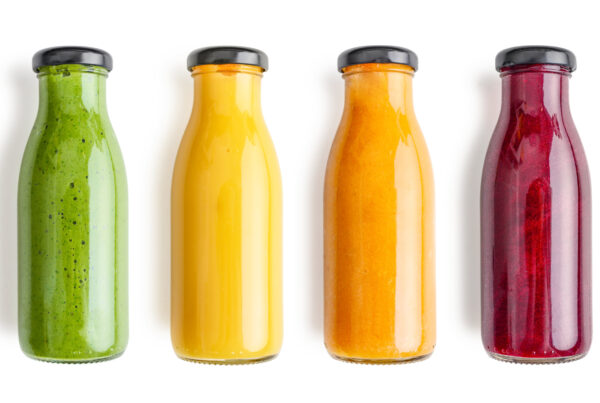”Nebraska, do you pay attention to the latest nutrition trends? This week's article takes a look at several popular trends and benefits. We hope you find this helpful for your own nutrition choices!
Reading time: 8 Minutes
MWi Hack:
- Read up on 10 current ideas that can improve your daily nutrition
- Try replacing some components of your current diet with these current trends
MWi Summary:
- 10 Nutrition trends to take note of:
- Pre-biotics
- Veggie-packed products
- Coconut plant-based yogurts
- Allergy aware
- Puffed snacks
- Healthy chocolate mashups
- Portable and single-serve (from raw honey to flavored fiber)
- Low-carb coatings, crumbs, and croutons
- Protein-packed coffee
- Innovative dairy (flavored cottage cheese and lactose-free ice cream)
Ten Popular Nutrition Trends
A nutritionist goes on a trend-spotting expedition at a recent food and nutrition conference.
Beyond the scientific sessions, the conference included a huge hall of exhibitors displaying new food products and the latest technologies. One thing that stood out to me this year was the universal truth of trend spotting: For every trend, there is a counter-trend. For instance, plant-based milks were big, but so were real milks with added benefits, such as the pediatrician-approved Horizon Organic Growing Years whole milk fortified with DHA omega-3s, prebiotics, and choline – an essential nutrient for brain development.
Grain-free seemed to be the new gluten-free. Yet I also saw brands boasting about their super grains – from sprouted and fresh-pressed grains in breads, wraps, and pizza crusts to high-fiber freekeh flour.
Here’s a look at 10 major nutrition trends:
- Prebiotics.
- Veggie-packed products. Think tomato sauce with ten vegetables or beet crackers.
- Coconut plant-based yogurts.
- Allergy aware.
- Puffed snacks.
- Healthy chocolate mashups.
- Portable and single-serve, from raw honey to flavored fiber.
- Low-carb coatings, crumbs, and croutons.
- Protein-packed coffee.
- Innovative dairy – flavored cottage cheese and lactose-free ice cream.
1. Prebiotics are the new probiotics.
Prebiotics promote the growth of beneficial bacteria, aka probiotics. While prebiotics have been in the shadow of the living bacteria themselves, now there’s a greater appreciation for these behind-the-scenes players for their role in improving the gut microbiome. I spotted prebiotics (dietary fibers that feed friendly gut bacteria) in everything from sparkling tonics and powdered supplements to the new Gut Happy Cookies from Uplift Foods.
2. Vegetables are working overtime.
There were souped-up sauces – including Otamot’s tomato sauce that actually contains ten different vegetables – True Made’s ketchup and BBQ sauces with hidden vegetables instead of added sugar and Prego tomato sauces with kale, white beans, and chickpeas. Vegetables like beets and sweet potatoes were also showing up in colorful wraps, crackers, chips, cooking sauces, and “superfood” powders.
3. Still crazy for coconut.
Coconut is still going strong-featured in snacks like Unreal’s dark chocolate coconut bars and new bars from Bob’s Red Mill and OHi Food Company from Hawaii. Coconut cream was the primary ingredient in new plant-based yogurts, yet this is a good reminder that dairy-free does not necessarily mean more nutritious. One plant-based yogurt brand, for example, contains 50% of your daily saturated fat and only 2% of calcium per serving. With all of these so-called dairy alternatives, it’s important to ask: “Is it really better?”
4. Allergen-free and allergy aware.
It was common to see products promoting their status as free from the eight common allergens with symbols declaring nut-free, dairy-free, soy-free, and more. This was especially true for school-friendly snacks.
MetaBall Energy Bites were one of many allergy-friendly snacks on the expo floor. These gluten-free, plant-based snacks were developed by a PhD mom looking for safe, wholesome snacks for her kids who have severe food allergies. Beyond the allergen-free products, a company called MeWe created flavored peanut butter packets to introduce to babies six months and older to peanuts, which may help reduce the risk of developing a peanut allergy.
5. Puffs are the new chips.
When did extruded puffs become a thing? There were many different puffed snacks promoted as a “smarter way to snack” (higher protein and lower carbs compared to your typical potato chip) or school-friendly due to the lack of nuts and other common allergens. Varieties of puffs included baked peanut puffs, chickpea puffs, veggie puffs, paleo puffs, and honey puffs.
6. Healthy and indulgent mashups.
Several brands were competing in the healthy snack category, especially snacks with dark chocolate plus some type of wholesome ingredient. A company called Undercover offers chocolate-covered crispy quinoa, described as “healthy ingredients in disguise.” Other examples included Superseedz with dark chocolate and sea salt pumpkin seeds and 88 Acres dark chocolate and sea salt seed’nola (a seed-based granola).
7. Portable and single-serve.
Since we’re all on-the-go and demand convenience, companies are responding with single-serve portable packages, such as a new yogurt and nut butter pouch from the Cultured Snacking Co. and packets of flavored fiber and matcha green tea for adding to bottled water. Nature Nate’s Honey Co. showcased single-serve packs of raw and unfiltered honey, including a new Raw Energy honey promoted as a “no-crash boost for your active lifestyle.”
8. Low-carb coatings, crumbs, and croutons.
Cauliflower has jumped from pizza crusts to coatings for chicken nuggets. Dehydrated pea protein was packaged in a shaker for breadless crumbs. Two different companies promoted alternatives to croutons: Carrington Farms Crounons (the “non-crouton”) made from crispy puffed quinoa and Shrewd Food Protein Croutons, touted as keto-friendly.
9. Protein coffee and other protein-packed products.
Protein was showing up in some unexpected places, including the new Stok protein cold brew coffee. It was common to see grams of protein called out on the front of a package label, including on the higher-protein pastas made with lentils, black beans, edamame, and chickpeas, or on the several brands of meat sticks and jerky. Protein was also touted on packages of a new breakfast hummus by Sabra. The portable hummus toast kit includes a cup of chickpea hummus with crispy whole-grain toast and everything bagel seasoning.
10. Dairy gets crafty.
I was amazed by all the innovations in the dairy category. In contrast to the multiple dairy-free frozen desserts at the expo, Beckon Ice Cream proudly claimed to be “dairy full.” This lactose-free ice cream was created by a young woman who is lactose intolerant but didn’t want to give up real dairy ice cream. Oikos Pro Fuel is a new protein-packed caffeinated dairy drink with 25 g protein and 100 mg caffeine. Cottage cheese is coming on strong (perhaps the new Greek yogurt?). Good Culture sampled their pasture-raised and certified organic cottage cheese, including fruit-flavored cups and a new double cream (6% fat) cottage cheese.
MWi would like to thank Janet Helm for sharing her expert insights with our community. Read the original article:
https://health.usnews.com/health-news/blogs/eat-run/articles/top-food-trends-for-2020
About the Author
Janet Helm, MS, RDN, is a registered dietitian/nutritionist who specializes in nutrition and culinary communications. She’s an expert at translating the science of nutrition into intelligible words – and great food choices. She’s the author of a book with Cooking Light magazine: “The Food Lover’s Healthy Habits Cookbook,” and is co-founder of the Nutrition Blog Network and Healthy Aperture. You can connect with her on Twitter @janethelm and through her blog Nutrition Unplugged.






